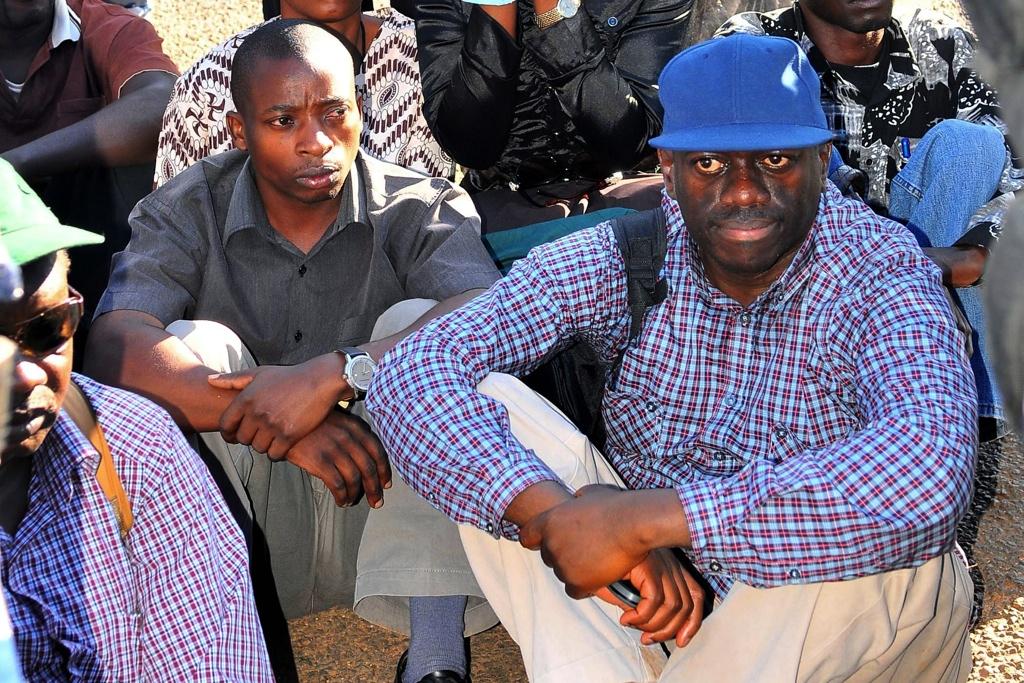Uganda government fires on protesters, 1 dead
Ugandan opposition leader Kizza Besigye, right, and other opposition party members watched by police at Kampala on April 11, 2011. Ugandan police arrested Besigye as he tried to stage a protest against rising prices amid a ban on demonstrations.
NAIROBI, Kenya — One Uganda protester was killed and dozens injured in Kampala Thursday when soldiers and police fired live rounds and tear gas to break up protests against the rising cost of food. Opposition leader Kizza Besigye was shot in the hand.
Uganda's second "walk-to-work" protest this week followed Monday’s march which was quickly shutdown by police using tear gas. The Thursday protest took part in different parts of the city.
Popular anger over spiralling food and fuel prices has been seized on by the opposition which says government corruption and incompetence is to blame. Anti-government demonstrations also occured this week in two other African countries, Swaziland and Burkina Faso.
In the suburb of Kasangati, up to 1,000 supporters gathered around opposition leader Besigye who was confronted by anti-riot police when he left his house by foot in the morning.
“We stopped him from walking to work because we received information that he had asked people to join him on the way to create chaos in town," said police spokesman Vincent Ssekate.
“There are laws governing processions, and Besigye should follow these guidelines,” he told Reuters.
Police fired in the air and used tear gas to disperse the protesters who fought back when military police tried to arrest Besigye, leader of the opposition Forum for Democratic Change. In the ensuing scuffle Besigye was struck with a rubber bullet before being taken to hospital under police and military guard.
“Shortly after the firing begun I was hit and I suspect it was a rubber bullet,” Besigye said later.
One group of protesters took refuge in a nearby hospital. When they began to hurl rocks police responded with tear gas.
Wiping stinging tears from her eyes hospital worker Mary Nabu told the Associated Press that patients had been affected and some mothers had fled with their sick children. A Red Cross spokesperson said that among 37 people injured was a pregnant woman hit in the stomach by a stray bullet while going for a routine check-up at the Kasangati hospital.
One woman was killed and barricades were thrown up by groups of young men fighting running battles with riot police, according to local reports. Riots also erupted in some regional Ugandan towns.
The army and military police were deployed alongside regular police. Military police, in their signature red headgear, are especially feared for their heavy-handed approach to crowd control, frequently firing live ammunition and meting out brutal beatings.
Besigye challenged President Yoweri Museveni in the February election and claimed fraud after winning only 26 percent of the vote. Besigye was arrested earlier this week and charged with inciting violence during the first walk-to-work protest.
His calls for “Egypt-style” protests to end the 25-year rule of Museveni have been largely ignored at least partly because of the overwhelming police presence on the streets of Kampala and a ban on political gatherings.
“Opposition activists are trying to peacefully protest the cost of living and they are met by the deployment of the army, the indiscriminate use of tear gas and lethal force,” Godfrey Odongo, Uganda researcher at Amnesty International, told GlobalPost.
“The government is sanctioning the violation of human rights,” he added.
Observers say the zero tolerance attitude toward protest is part of a wider pattern of repression.
“Criticism of government is often taken as an attempt to incite violence or overthrow the government,” said Maria Burnett, a researcher at Human Rights Watch.
“This is a persistent problem in Uganda where the police response is frequently heavy-handed and lacks restraint,” she said. In September 2009 clashes between anti-government protestors and police left 40 dead.
The Uganda Law Society this week called a press conference in Kampala to warn that Uganda was becoming “a police state”.
Wary of the unrest and revolutionary fervor that has overthrown longtime rulers in Egypt and Tunisia and sparked civil war in Libya, some sub-Saharan governments are showing an increasing intolerance of dissent.
Earlier this week pro-democracy activists in Swaziland were tear-gassed, beaten with batons and arrested when they attempted to protest the rule of King Mswati III and called for reform. Political parties have been banned for almost 40 years in Africa’s last absolute monarchy where Mswati’s opulent lifestyle contrasts sharply with the grinding poverty in which most of his subjects live.
Thursday Burkina Faso was rocked by anti-government demonstrations protesting rising food prices.
We want to hear your feedback so we can keep improving our website, theworld.org. Please fill out this quick survey and let us know your thoughts (your answers will be anonymous). Thanks for your time!
